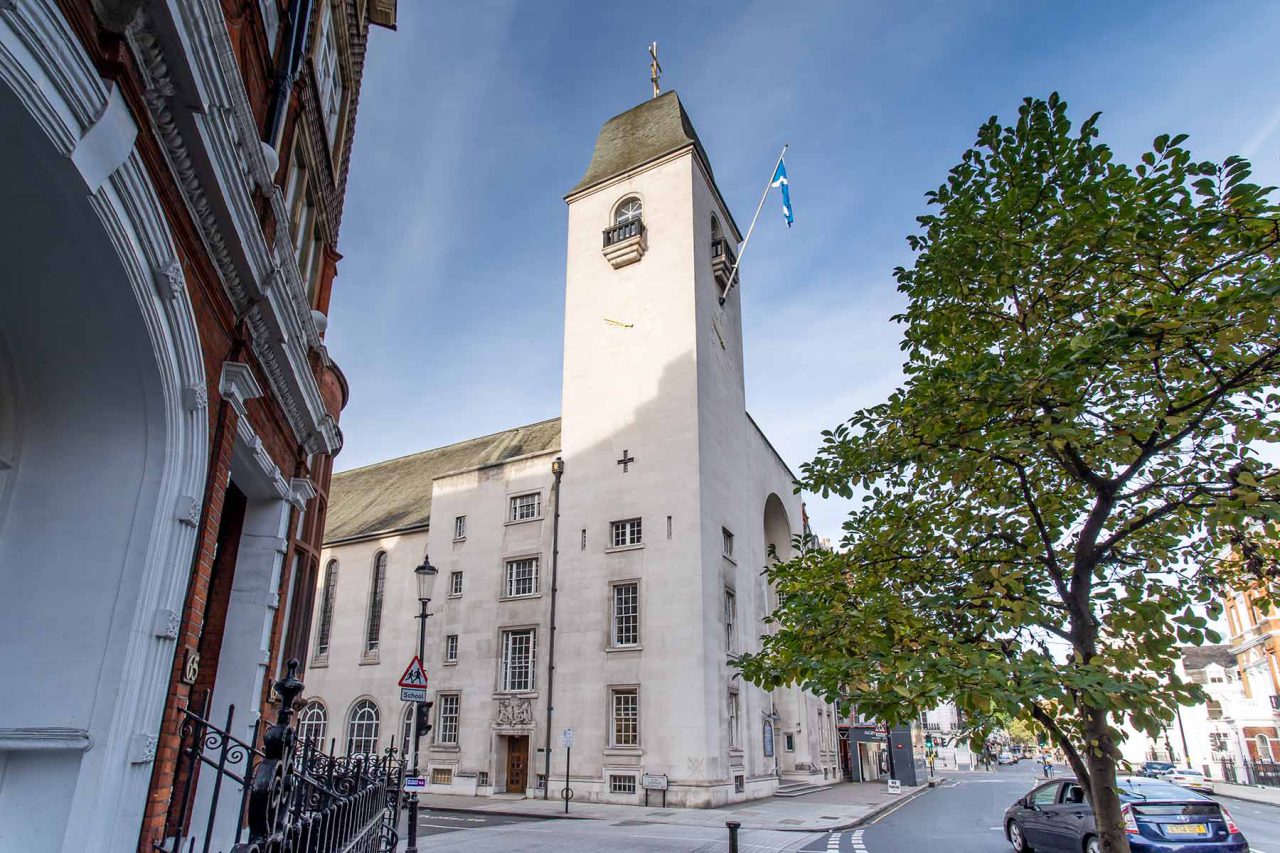Sermon 16th November 2025
75th ANNIVERSARY OF THE LAYING OF THE FOUNDATION STONE
When some were speaking about the temple,
how it was adorned with beautiful stones and gifts dedicated to God,
Jesus said, “As for these things that you see,
the days will come when not one stone will be left upon another;
all will be thrown down.” Luke 21:5
One of this autumn’s movie releases: Downton Abbey: The Grand Finale.
It’s time to say goodbye.
Depending on your view of the long running TV drama and movie spin-offs –
you may consider that statement overdue or hear it with sorrow.
Some years ago, the actor, Hugh Bonneville – “Lord Grantham” –
claimed that the programme’s central character was – the house:
Characters come and go; but the house remains the core.
“We are just visitors, lucky to be there.”
On a Sunday of anniversary – seventy-five years on
from the laying of the foundation stone of the “new” St Columba’s,
recalling/celebrating a little of the history of congregation
and the bricks and mortar we call home,
might that be our text/motto for today.
“We are just visitors, lucky to be here.”
A former pupil of Hill Houe of the 1960’s told me to days ago:
“It is my favourite London church.”
We are fortunate to enjoy the space, peace and light
that architect’s vision and artisans’ craft has bequeathed us.
A sanctuary that permits populated pews for Remembrance, wedding day or memorial, resonates with music from choir or lone piper.
Yet, also offers the silence and solitude
for the anonymous, midweek visitor, passing through;
both stage, lit for public moments,
and private oasis when most needed.
As has been said: “The building is our best member of staff.”
Ready to serve – worthy of a pat on the pillar.
So, it is with a delicious irony on the day we celebrate the raising of a roof –
its foundation stone at least –
the lectionary gives us uncomfortable, Jesus words:
“The days will come when not one stone will be left upon another;
all will be thrown down.”
Words addressed to disciples who have been gawping
at the magnificence of the Jerusalem Temple –
truly a construction of shock and awe.
The length of several city blocks; reputedly so covered in gold
that the unsuspecting pilgrim would be blinded by its reflection.
Magnificent symbol of religious permanence and confidence;
the very dwelling place of God.
Yet, in these final days and hours before his own arrest, trial and execution,
standing alongside, looking at the same temple,
Jesus and his disciples do not see the same thing.
“It won’t last.”
Ruination may/will be painful – but remember,
in the end, bricks and mortar are not the point.
Look beyond the grandeur.
God is not incarcerated or domesticated by any construction, however fine.
God exceeds every edifice, every institution.
[Yesterday, I was caught on the hop on a touchline,
by a fellow parent watching a school sporting fixture –
“Will religion survive?”
My inadequate reply: “The form of institutional church may definitely change,
but the search for meaning will not disappear.”
When the author of Luke’s Gospel collated and edited the words,
stories and encounters of Jesus,
the first hearers would already be aware of Jerusalem’s destruction by the Romans in 70AD.
Jesus’ warnings of ordeals ahead, already painfully played out.
As Jesus predicts the passing of even the most substantial of temples,
he teaches what to do when the walls come tumbling down.
“Do not be terrified – when the earth shakes, and nations make war,
when imposters preach gospels of fear, resentment, and hatred.
Don’t give in to despair.
Don’t neglect to bear witness.
Know that God is near, no matter what the world looks or feels like.
Expect things to get hard.
Endure even when they do.
That note of endurance was illustrated in the words of Dr Scott,
welcoming the Queen to this site, seventy-five years ago:
“This is a date which we have looked forward to
ever since that fateful Sunday morning of the 11th of May 1941.
We were then indeed filled with sorrow.
Our church, rich in tender memories and hallowed associations
was a smouldering ruin.
Yet your Majesty, we were neither daunted nor dismayed.
True to our ancient motto, Nec Tamen Consumebatur,
the Kirk Session met that very day and resolved
that God willing, when the war was over,
we should build a new church on the old site.
In this we were only reflecting the spirit of the whole nation
in those days of dreadful ordeal.”
In turn Queen Elizabeth, the late Queen Mother replied:
“I am delighted to know that the new building,
so beautifully designed by Mr Edward Maufe,
will be thoroughly equipped to carry on and extend
that social and cultural work amongst Scottish people, young and old,
for which St Columba’s has always been famous;
but the centre and the crown of the whole building
will be a beautiful place of worship
in which Scots men and women, of this generation and the generation to come,
will worship God after the manner of their fathers.”
The Queen Mother gave voice to the vision of this building –
which, as I have suggested before,
is less Downton Abbey than its earlier predecessor of mansion and manners –
Upstairs, Downstairs.
Upstairs, under this sheltering roof –
the cry and vitality of the child, the promise of marriage,
the Last Post of Remembrance, the Reveille of Easter –
the rhythm of the Christian year and the seasons of our lives –
each and all placed here, housed and held in prayer.
While all the while, downstairs,
hospitality to church member or homeless guest,
the assemblies and sports of the school pupil,
the music of the dance,
the quiet heroics of Alcoholics Anonymous,
the decision-making of the Kirk Session,
and the sheer hard graft, so often unseen,
that ongoing congregational life requires –
rotas and roses, boilers and baritones.
Upstairs, Downstairs –
Expressed in a few moments
by the presentation of long service certificates
to some of our elders (trustees of this family of faith) by some of our young people:
(A symbol of continuity; an honouring and an educating, across the generations.)
Expressed by a meals shared,
both in chapel communion and catered Lower Hall.
Expressed in a wondrous Sounds of St Columba’s Recital
from our own choir this afternoon.
Expressed in the first evening of the new Night Shelter season
that starts once again this evening.
We may indeed simply be, “visitors lucky to be here.”
But by the grace of God, in our time and place,
may we maintain the integrity of Upstairs, Downstairs St Columba’s lives –
worship and service, friendship and faith;
responding prayerfully and creatively
to the circumstances, ordeals, ambiguities and blessings of our age.


